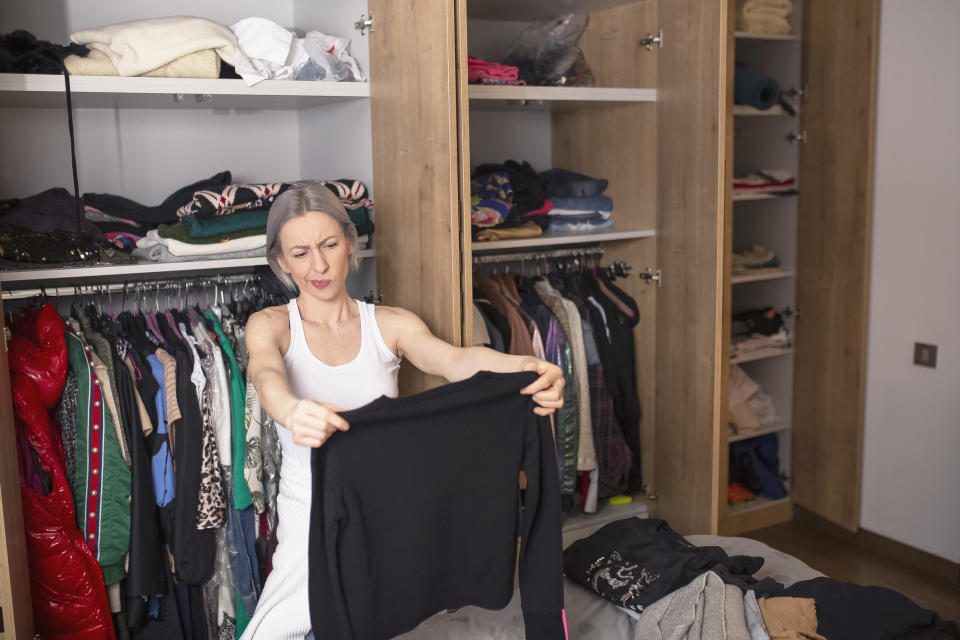How to make money by cleaning your house

It’s no secret that home organisation is having a bit of a moment. Everywhere we look, we are being told to throw as much of our stuff away as possible, with looking like your house has been robbed the ultimate minimalist goal.
Decluttering rules in the horror storm that is 2020, and staying in on Saturday night to organise your cooking utensils is suddenly a perfectly acceptable thing to write in the group chat.
More from Jo: Two women reveal what life on JobKeeper is really like
More from Jo: Meet the woman selling spatulas to fund her 2021 Olympics dream
But if, like me, you struggle to choose what to cull and what to keep in your home, use some basic principles of economics to help you out. Who knew that your Year 10 commerce study was finally going to come in handy, right?
Following some easy tried-and-tested rules of finance is the easiest way to clear the junk.
Risk and return
I used to have four buckets at my place. No idea why, but they took up an awful lot of space.
Instead of asking, “might I need these one day?” I started decluttering by telling myself, “On the odd, crazy chance I suddenly needed four buckets simultaneously, it’d only cost me $9 to buy a couple back at the shops, and in the meantime I get all this space back”.
Risk; having to buy back a bucket for a couple of bucks, reward; way more space in my laundry forever. No brainer.
This can be applied across any low-cost or easy-to-obtain-again-in-case-of-dire-emergency set of items. You’d amazed how easy the risk/reward principle is to use in your home.
Let’s say, pet paraphernalia for a pet you no longer own? Give it away, if by some weird chance you get another rabbit, you know where the pet store is.
Inventory management
What if you thought of every item in your home simply as inventory that you have to manage? If you have less inventory, management and storage is easier.
Less inventory means fewer hours sorting, fewer hours cleaning and putting away, and ultimately way less effort.
Christmas presents you don’t want? Excess stock. Clothes that need mending? Damaged stock. Stuff you could give away or on-sell? That’s just inventory that could be monetised.
And as soon as you start to view items in your home simply as stock you have to manage – bringing extra crap into your house in the first place just so you have to manage that excess inventory also becomes less attractive.
Cash (flow) is king
Selling excess items to declutter has the secondary effect of making you a few bucks, and also means you don’t have to contribute to some ginormous increase in landfill thanks to the current decluttering trend.
But be mindful: the aim here is to declutter, and a secondary win is making small amounts of cash. Cash flow is what it is all about here. Selling items cheaply means they’ll race out of your home faster than you can say ‘$10 side table, pick up today’.
Also read: How to turn your rubbish into $5,300
Make the price point so attractive that people online help you declutter, and you make a bit of cash on the side. Don’t haggle with strangers on Facebook Marketplace over a $12 pair of shoes.
Right now, in the small business we’ll call Trying to Declutter Your Place, cash flow beats profit.
Instead, thank them for assisting you with your excess inventory, knock the price down to nine bucks, and smile knowing you’re the winner: cash has flowed in, clutter has flowed out, the end.
Invest for the long term
We all understand this principle when it comes to the share market, or superannuation. But it can be easily applied to a 2020 decluttering frenzy.
Ask yourself: will I still want this item next year? In five years? If I move house again in a couple of years, would I bother taking this with me?
If the answer is no to any of those questions, then – see you later, old university textbooks. In a while, holiday ticket stubs I’m never going to put in a keepsake album. Get the point?
Anything that isn’t going to be with you as you grow old, turf it. Sound investments are long term investments.
They say financial decisions are best made without emotion. Making junk eradication a simple series of small decisions based on economics will make the job easier, or at least take the angst out of throwing away your old school report cards.
Seriously though – throw. Them. Away.
Want 2021 to be your best (financial) year yet? Follow Yahoo Finance on Facebook, LinkedIn, Instagram and Twitter, and subscribe to the free Fully Briefed daily newsletter here.

 Yahoo Finance
Yahoo Finance 